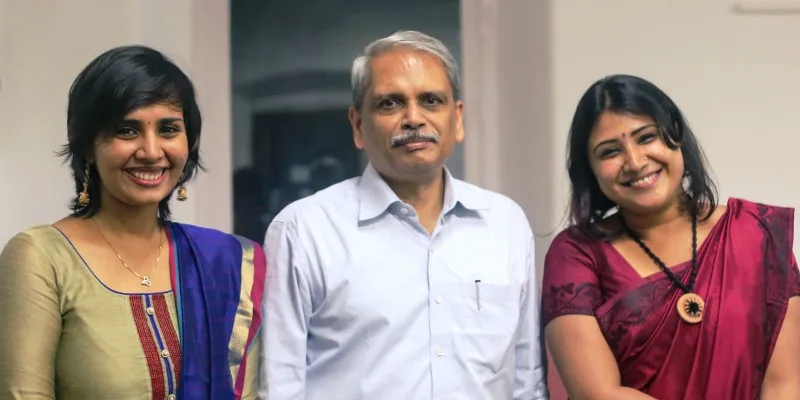The journey of Aeka Kerala’s first women owned biotech and biochemical startup
The story of Aeka was born seven years ago at Sree Chitra Thirunal College of Engineering, Trivandrum, after Aardra Chandra Mouli and Gayathri Thankachi V. finished their classes. A dream and passion of the duo and their classmates and alma mater of Biotechnology and Biochemical Engineering SCTCE batch, Aeka Biochemicals Pvt. Ltd is the first biotech and biochemical startup venture based out of Trivandrum in Kerala wholly owned by women.
The company undertakes the manufacture of biotechnological, biochemical and enzymatic products, chemical products or extracts of biological origin. The team at Aeka, Aardra says, is passionate about creating a friendly work atmosphere that fosters creativity, teamwork, innovation, and unity. “This in turn helps our efforts to manufacture products that are aimed at, and useful for, the common man,” adds Aardra.

Core team
Aardra and Gayathri hold a bachelor’s degree in Biotechnology and Biochemical Engineering from SCT College of Engineering, Trivandrum. Aardra pursued her master’s degree in management from Warwick Business School, UK, with a full scholarship. Aardra and Gayathri have work experience in product management and marketing and biotech and biomedical marketing, respectively.
The head of Aeka’s scientific team is Nidhin Sreekumar, is pursuing a PhD at NIT Calicut, and is a Senior Research Fellow at NIIST-CSIR. Aeka’s lab head is Jayaram K. After completing his B.Tech in Biotechnology and Biochemical Engineering from SCTCE, he went on to complete his M.Tech in Industrial Biotechnology from Manipal University. “Our mentor and scientific consultant, V.P. Potty, has 42 years of research experience, and has to his credit well over a hundred published papers,” adds Aardra.

Also Read: After tourism, Kerala is now creating a strong State-fuelled entrepreneurial ecosystem
Challenges and patriarchal run-ins
However, establishing a biotech company in Kerala, where there are very few biotech startups, has several challenges. One of which, Aardra says, includes the usual red tape. A major issue they faced was the lack of a single, comprehensive, source of information regarding the legal and regulatory processes to be carried out and the licenses to be obtained for such a company as Aeka. “However, guides, mentors, and local authorities proved supportive, and sound advice from experienced hands helped us overcome the initial hassles,” adds Aardra.
Although, Aardra says, they were fortunate in being the recipients of courteous and thoughtful behaviour during the majority of their interactions with authorities, clients, and the general public, they had their scrapes with a largely patriarchal society.
Aardra says, “It would be difficult to say that we have had completely smooth sailing. We did, on occasion, face individuals who wanted to know ‘who exactly is behind you? I don’t believe that two ‘girls’ can want to or know how to run a business!’ Although very few instances, but ones that are well on their way to becoming funny anecdotes.”
Also read: Women in Technology: Bridging the Compensation Gap
Building facilities and products
On October 3, 2014, Aeka began its operations, and November, Aeka was shortlisted and selected for the Kerala State Entrepreneur Development Mission scheme of the Government of Kerala in association with the Kerala Financial Corporation (KFC).

This, Aardra says, was a major milestone, as it represented the first external funding received by the company since its inception. It was in January the team began the establishment of their laboratory and small-scale production facility at Vazhuthacaud, Trivandrum. Aeka’s Vazhuthacaud facility comprises a full-fledged wet laboratory, basic analytical laboratory, and pilot-scale biochemical production units.
In February, they introduced their marketing wing Aeka Labs that handles the marketing activities and market research. Aeka Labs has its office at Jagathy, and is also responsible for the market promotion of the bioproducts.
On June 1, 2015, the scientific work at the company’s newly established laboratory was flagged off by Dr. V.P. Potty, their mentor a senior scientist. “In the heart of the city, Aeka’s Vazhuthacaud facility is optimised so as to be eco-friendly, pollutant-free, and a green, zero-effluent zone. The lab and manufacturing unit are equipped for microbiology, biotechnology, quality control, and chemical (wet lab) work,” says Aardra. In July, they initiated the lab-scale production and testing of what has evolved into its Sasya range of products.
Also read: From a chip design engineer to the VP Business Development InMobi, Vasuta Agarwal has donned several hats in her corporate life
Their newly revamped website was launched in September of this year, which helped the team establish our online and social media presence more concretely. Aeka launched its first product range on October 9, 2015, the Sasya series of microbial plant growth promoters – for safe and chemical-free farming.
The range consists of the following products, each being specially formulated and tested for specific target crops and modes of application:
- Sasya Sutra – for nursery and garden use, via seed and root treatment.
- Sasya Mitra – for kitchen, home or terrace gardens, and small farms, via foliar application.
- Sasya Raksha – for gardens, and farms, via foliar application.
- Sasya Poshak – large farms, via seed, root and foliar application.
- Sasya Poshak+ – plantations, via seed, root and foliar application.
Team and its focus
As a team, Aeka, believes in putting the environment first. A close second, Aardra says, is their emphasis on meeting the needs of the local community, and then broadening the focus outwards to adapting the products and solutions developed at Aeka into wider areas of application.
She says that everyday objective at Aeka is to create solutions that meet and satisfy social and environmental needs. “We have taken a conscious decision to start small, and to do all that is in our power to minimise waste and energy loss at our facility. Maximising our contribution to the community while staying green forms the bedrock of all our efforts,” adds Aardra.
Revenue model and future
The revenue model the team has adopted is the production model, where the company manufactures and sells its products to target customers, thus generating revenue. The first year Aeka was focussed on the successful set-up of the facility and the development of their MB-PGP range.
Now with the support of the in-house team and the extensive experience of their expert consultants – the R&D pipeline for 2015–2017 includes plans for more custom-made plant growth promotion products, and a green solution that involves the development of an innovative and eco-friendly technique for small-scale waste water recycling based on biochemical and microbial methods that employ the application of indigenous materials.
Aeka aims to establish itself as a company that addresses current needs that are relevant to local as well as global consumers.







